Mayor Miro Weinberger | City of BurlingtonOfficial website
Mayor Miro Weinberger | City of BurlingtonOfficial website
Burlington, Vt. – On June 16, Mayor Weinberger announced the launch of a new and expanded BTVstat Data Hub on the City’s website, and released the 2023 Housing Report, prepared by the Burlington Planning Department with collaboration from the Burlington Department of Planning and Inspection and the Burlington Community and Economic Development Office.
"Throughout my time as Mayor, collecting, examining, and sharing data has been a critical step in the process of developing good policy based on evidence, not intuitions, and this approach has driven progress on some of our greatest challenges including climate change, public safety, and the City’s financial health,” said Mayor Miro Weinberger. “The only way to make good on the promise of housing as a human right is to build a lot more homes now and for many years to come. Our refreshed and expanded housing dashboard, with information that is continuously updated, is intended to keep the City team and the whole community focused on our progress towards this critical goal.”
“It has long been the City’s practice to use and share data related to crafting policy and decision-making across the Administration. In our response to the pandemic, we built on and improved those practices, particularly in the way we shared data with the public in an accessible way,” said Meagan Tuttle, Planning Director for the City of Burlington. “The Planning Department is excited to launch the new BTVstat Data Hub as an improved tool for the community to use and learn from key data about the most pressing issues facing the City today.”
Background
The City began sharing city data publicly in 2014, and in 2016, Mayor Weinberger implemented BTVstat. BTVstat is a performance management program to review operational and equity performance metrics for City Departments, identify challenges, track progress, control costs, and promote accountability, learning, and collaboration.
In 2020, Mayor Weinberger issued an Executive Order on Open Data Policy, developed in cooperation with the Sunlight Foundation, which outlined principles, standards, and a governance framework to guide the City’s efforts to share its data publicly.
For several years, data dashboards have been available on key priorities including Financial Health and Public Safety, and in 2022, the Housing Dashboard was launched to provide insight and accountability into the City’s work and progress toward the Housing Action Plan goals. Previously, these dashboards could be found by navigating to individual City Departments’ web pages.
BTVstat Data Hub
The new BTVstat Data Hub is a resource that brings together the existing data dashboards with other featured data visualizations—such as the City’s workforce demographics. It also includes key datasets from the City and US Census that are machine-readable and can be downloaded. The Hub will continue to expand to include other information about priority issues and track progress on major initiatives.
On the new BTVstat Data Hub, community members are invited to explore the data, create maps and charts, or build apps using APIs. To explore the BTVstat Data Hub, visit: data.burlingtonvt.gov.
BTVstat Housing Data
The most recent BTVstat presentation by the City’s analysts explored housing trends and the impacts of housing policy initiatives over recent years:
New Residential Housing Units: In late 2021, Mayor Weinberger announced a 10-point housing plan, which included a target of doubling the rate of housing production over the following 5 years to create 1,250 new homes. In 2012, the ten-year average was 61 new units per year; in 2022, this average was 115 units per year. Since the development of this plan, 1,058 new units have been built or are in the permitting and construction pipeline, representing 84% of this goal.
New residential units (left), Progress toward Mayor’s 2021 goal to build 1,250 homes in 5 years
Renters and Owners: 38% of Burlington housing units are owner-occupied, a rate lower than many peer communities. Although the rate has increased over the last 5 years, (from 2% to 10%), Black households in Burlington are still much less likely to own their home than their White counterparts. The large majority of housing in the center of the city are rentals, limiting options for those looking to own a home.
Population in Owner-Occupied Housing (left), Percent Owner-Occupied by Census Tract (right)
Housing Costs: Single-family home prices in Burlington have declined since their peak in the second quarter of 2022, but remain substantially higher than pre-pandemic levels. A home at the current median price would cost $3,240/mo (including mortgage, property tax, and insurance), and would be affordable to a household earning $129,600 or more. More than a third of Burlington renters are severely cost-burdened – paying more than half their household income on rent.
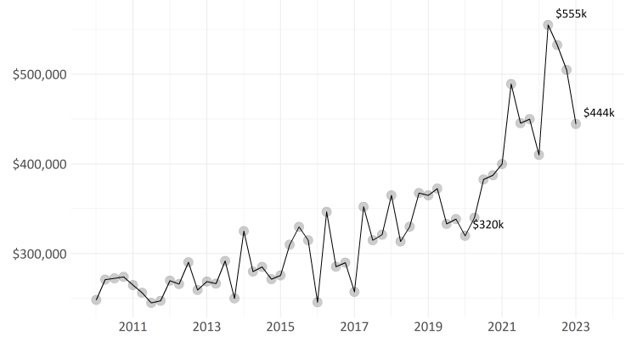
Median Single Family Home Sale Price
Affordable Housing Development: The creation of permanently affordable housing has been a priority of the City for decades. Recent changes in local housing policy including increased investment for the Housing Trust Fund, changes to the Inclusionary Zoning Ordinance, and changes to Burlington’s land use laws, including eliminating parking minimums and the creation of a downtown form-based code, have helped accelerate housing development and the creation of new affordable units. Since 2012, 27% of all units built are permanently affordable.
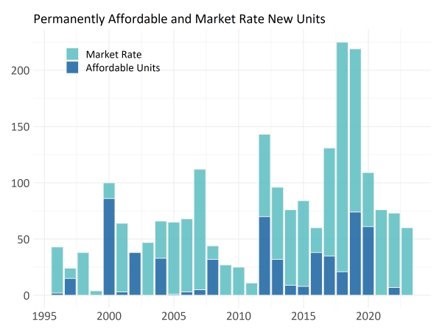
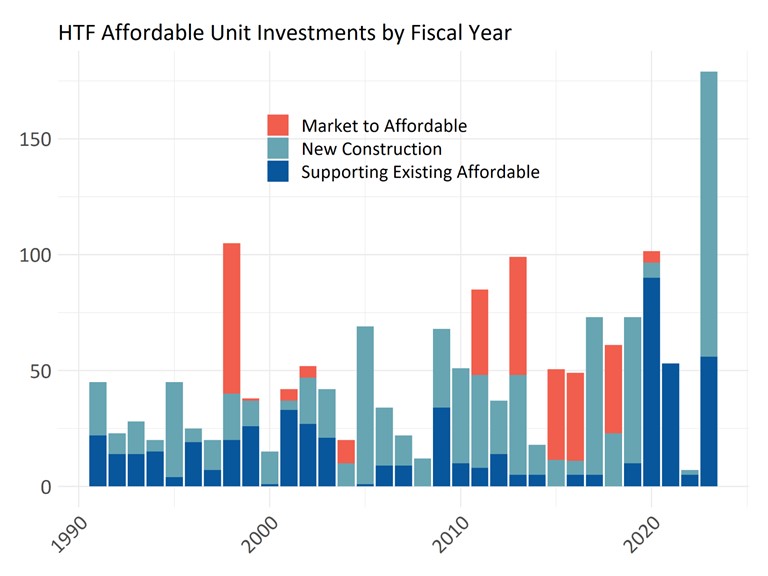
Households Experiencing Homelessness: Also in the Mayor’s 2021 10-point housing plan, were proposals later approved by the City Council to strengthen the Coordinated Entry System with the addition of new staff resources and to create the Special Assistant to End Homelessness in CEDO. Since those investments were made in 2022, Coordinated Entry is successfully connecting an average of 25 households per month to permanent housing, and is now central to the proposed Chittenden Country strategy in response to the end of the State motel program.
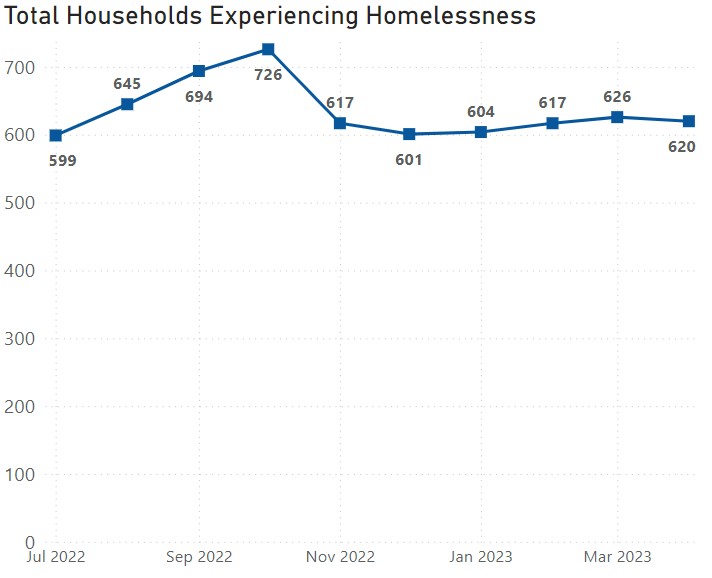
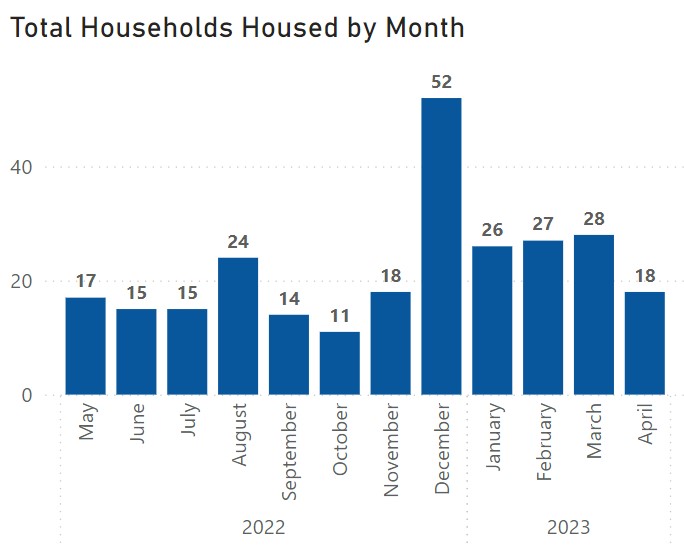
The complete 2023 BTVstat Housing Report is available here.
Original source can be found here.



 Alerts Sign-up
Alerts Sign-up